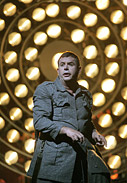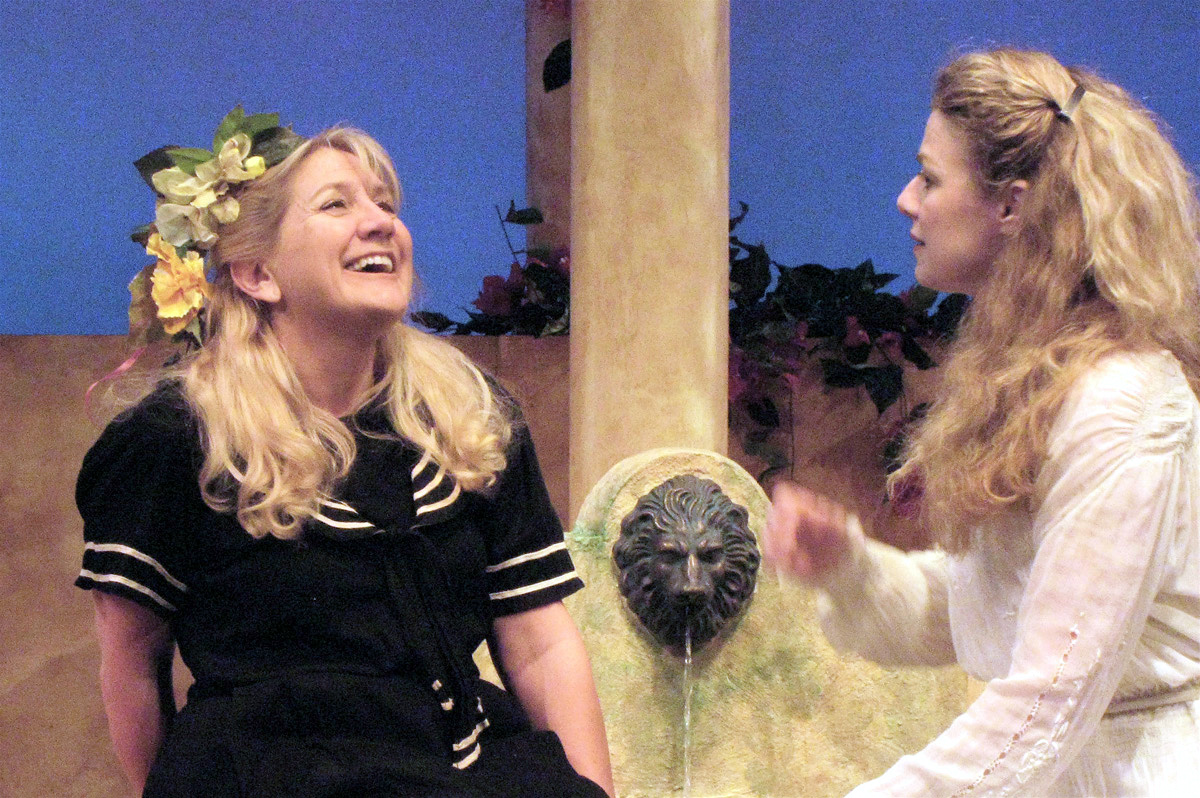
| Home Writers Directory Carol Davis April 20, 2007 |

by Carol Davis
SAN DIEGO, Ca—I can’t
remember the last time I was physically on a seesaw,
but I can tell you that
theatre is sometimes like being on one, or in a grand
playground with many
toys from which to choose. As an example; one night I
might be sitting and
enjoying Enchanting April at Lamb’s Players Theatre in
Coronado, the
next night opera at the Civic Theatre listening to and watching
Wozzeck,
followed by an afternoon outing in the North County to see Wit.
In some ways it’s like getting
your high and low fixes by springing to
the top and looking out over the entire area almost with your head in
the clouds, no sooner to be bounced back down to the bottom where
everything
has a darker look. It’s checking the playground out from
both sides and appreciating the choices. Theatre has that many sides
and then some. San Diego theatre is a virtual playground when it comes
to variety.
So come join the rides with me.
Wozzeck
Alban Berg’s Wozzeck, the
long awaited, greatly anticipated ‘modern’
opera has come and will take a place in the annals of local opera
history after its last performance on the 22nd of this month. All the
hullabaloo,
horrific looking opera posters and ads will come down.
Tony Award winning Artistic director emeritus Des McAnuff of the
La Jolla Playhouse, will have made his opera directorial debut—his
San Diego swan song so to speak—before heading off to the Stratford
Festival
in Canada for his next assignment. Now i is up to those who
sat through Berg’s composition and watched the story unfold to give
an opinion on the performances of the artists, the overall look of the
production, and to sing its praises, or not.
Wozzeck,
a 90-minute opera is the fourth in this year's San Diego
Opera season and the first production of this piece to be presented
to local audiences. Based on Georg Büchner’s 1914 play, Woyzeck is
about a German soldier who killed his mistress, the mother of their
illegitimate son, after going mad with jealousy because of experiments
he’s subjected to by his superiors and the humiliation brought upon
him by both his mistress and his superiors. Unfortunately Büchner died
before he could finish it and Berg, an Austrian, who had seen the play
and wanted to compose an opera based on it had to wait until his
military service was over at the end of WWI. He began work on the
opera in 1914 and finished it in 1922.
 The
play examines just how far the government
The
play examines just how far the government
can go in torturing, humiliating
and haunting a
person before that person cracks. Not being
of sound mind to begin with in the case of Wozzeck,
it didn’t take much.
Given his station in life, he felt
he had no options. Wozzeck, in a sense,
represents
Everyman. He is on the lowest wrung of the totem
pole of society.
Because of the way he is treated, he
feels helpless and alone
with no one to defend and everyone watching him.
He agrees to be an experiment,
if you will, for the
government in order to earn whatever monies his
‘doctors’ give him so he can feed
his mistress and child,
while reaping the benefit of her company
as well. Someone of sound mind would have a difficult time
rationalizing this kind of experimentation on his body which had a
profound influence on his disturbed brain. However not being of
sound mind leaves the entire question of what an insanity plea for
murder would have looked like for Wozzeck, as a round table
discussion, had he had council.
In the opera, German bass Franz
Hawlata, who is making his
company debut, and who has sung this role more than 60 times, is a
formidable Wozzeck vocally. Nevertheless, his voice, his physical
presence and his mannerisms, while strong and his acting expressive,
never gave me a sense of urgency about his plight. He sings about
‘poor
folks like us’ and surely we can see the taunts of his superiors, some
slight changes in his posture but because he was always facing the
audience, his position, his singing style never seemed to change. In fact,
that was the missing link yours truly felt about this production, since he
was on the stage the entire 90, or so minutes.
While it was evident that he was
the object of the experiments by
the Doctor (American bass Dean Peterson); the haunting of the
Drum Major (American tenor Jay Hunter Morris); the infidelity of
Maria (American soprano Nina Warren) and the scrutiny of the Captain
(American tenor Chris Merritt) and the entire chorus who were
watching over his every move in every act, (there were three) and every
scene,
(there are five in each act) I was not convinced. The subtlety
eluded me and I was waiting for a big aha to happen, and it didn’t
until his tragic death at his own hands.
Berg’s score is another story.
If you go with the intention of hearing
anything soft, melodious and
memorable akin to Verdi, stop! It’s not
going to happen. The music definitely underscores the intensity of the
libretto, which Berg wrote. It is dissonant, atonal, loud, dramatic
(resident conductor Karen Keltner conducted beautifully) and not too
pleasing to the ear, if you are not inclined. In fact there were times
when the music was so loud that some of the voices could not be heard above
it.
Producers of Wozzeck are inured to such criticisms, of course.
In 1930,
the accomplished Jewish conductor Jascha Horenstein created such
excitement with the opera that Berg himself came to attend the
performances. Newspaper critics were not impressed. It is recounted on
the website www.classical.net that
one contemporary reviewer snorted:
"Jascha Horenstein conducts....but does
he make music? Who other than
the composer would know it? This music is such that it wouldn't matter
if a handful of notes were missing".
There were other distractions as
well. Set designer, Robert Brill (a long
time and oft collaborator of McAnuff’s) designed a huge, 24-foot-high
steel and Plexiglass arena with a maze of stairs, doors, openings and
bleachers
(somewhat like a Gestalt puzzle) and with a turnstile deck that
rotates in either
direction that could heard off and on. The
overwhelming size of it on the Civic
Theatre stage gave the opera
a larger look than it really is.
Stephen Terry’s lighting and
video designs are ingenious. Another
large piece of equipment in the shape of a U2 looking space ship
filled with lights suspended from the top of the arena seemed to be
following Wozzeck's every move. Somewhat like Big Brother. The
videos projected on a screen above the stage during scene and set
changes of Wozzeck in different poses are most impressive when
accompanied by the music. Especially riveting was the drowning
scene when Wozzeck lets the water flow over him.
Overall, S.D.O General Manager
Ian Campbell and Des McAnuff
are to be congratulated for their efforts in bringing together a
theatrical piece with a score many had never heard and will probably
not hear again for some time. I had expected something different and
for me the individual parts didn’t completely equal the whole, but we
can’t negate the entire endeavor as those in attendance on opening
night had a completely different take on it than I did. They were on
their collective feet, cheering and whistling at curtain call. So there
you go.
Wit
It’s not often that you know in
advance that the play you are about to
see is going to rock your socks off. Margaret Edson’s Wit, a memory
play that won a Pulitzer Prize for drama and won raves as the new kid
in town in 1999, is now in an excellent production at the North Coast
Repertory Theatre in Solana Beach. It stars Rosina Reynolds in stellar
performance as Professor Vivian Bearing.
As a teenager, I recall reading
John Donne's famous lines, and I could
not help recall them while watching Wit.
No man is an island, entire of itself; every man is a piece of
the continent, a part of the main. If a clod be washed away by the
sea, Europe is the less, as well as if a promontory were, as well as if
a manor of thy friend's or of thine own were: any man's death
diminishes me, because I am involved in mankind, and therefore never
send to know for whom the bells tolls; it tolls for thee.
Vivian Bearing, the central
character in Edson’s book, is in Stage Four
Metastatic Ovarian Cancer. It
seems that Donne’s works have more than
a passing interest to writers and professors, especially Bearing herself,
who is a professor of metaphysical poetry. In particular, she lives for
the 17th century works of John Donne..
 Dressed
in nothing but hospital gown
Dressed
in nothing but hospital gown
and ball cap covering her now- bald
head, and wheeling an intravenous pole,
set on a bare stage with long green
curtains arranged to resemble shower curtains
i.e. a hospital setting, (by
Marty Burnett) Dr.
Bearing (Reynolds) addresses the audience.
She tells us about her condition, and wishes it
were not so. “I would prefer
that a play be cast
in the mystic-heroic pastoral mode; but the facts,
most
notably Stage Four Metastic Cancer, conspire
against that. The Faerie
Queen this is not. It is not my intention to give away the plot, but I
think
I die in the end”.
And so we begin the journey,
the story of her gallant effort to "keep up
our spirits’ in the face of impending death; her experimental drug
therapy treatment (there are eight of them and no one so far has been
able to sustain them at the full dose); her brilliant musings on Donne,
and her interactions with her students. Bearing has chosen to be
somewhat of a guinea pig for this new drug and tries throughout
to be brave and not falter.
As the narration goes on we also
meet up with her doctors, Harvey
Kelekian (John Herzog) and Jason Posner, MD
(Dennis Henry) whose
main goal as doctors is research. Of that there
is no doubt. They all know
it and act accordingly. Although they seem
the stereotypical, all-business and
no sense of humor types, they do
convince. Nancy Burrows shines
as her nurse and Sandra Eagye proves
to be formidable as her colleague
who is with her in the end.
But the spotlight really shines
on Reynolds who is simply astonishing
as Dr. Bearing. I never had to be convinced of Reynolds’ talents as a
seasoned actress, director and fine human being, but this performance
tops anything she has done. In fact this is a centerpiece for her. In ninety
short minutes she is, all at once, a brilliant, self-confident professor who
recites the pros and cons of Donne’s work with aplomb, style and wit, all
done under the deft direction of David Hay. In her treatment of her
students,
she has the same self assured professionalism she claims to
revel in which comes over loud and strong. Her lectures, straight talk,
sense of humor and yes, wit are what grabs at you as the play goes from
present to past to present to well, until…
Gradually, there is a slight
fading of confidence, a nudge here and
there that all isn’t so fine, after all. The meds are taking a toll on her
and
she begins to falter, get smaller, weaker, less self-assured and more
dependent on others. All the while, Reynolds keeps the pace up,
the wise cracks coming, straight talk in a steady stream until she
literally fades into herself and becomes a shadow of her previous person.
It ain’t easy watching and everyone in the audience, I know, spilled a
collective tear as she slowly deteriorated, almost vanished in front of
us.
Jeanne Reith dressed everyone in
hospital gear and college looks
and Mia Bane Jacob’s lighting was exceptional to the end.
Wit plays through May 13th. I highly recommend seeing it.
To contact the North County Rep, call (858) 481-1055 or visit
the web
site www.northcoastrep.org
Enchanted April
Make preparations, sow some
seeds, stay expectant, keep the vision
in front of you, and stay hopeful, stay determined.
C. Beck…
Dream it- Believe it- Live it.
These could have been the very
words said by Lotty Wilton
(Kerry Meads) in Elizabeth Von Arnim's (her pen name) Enchanted
April. Rather these are words that relate to the newest and latest
craze:
The Secret, a self-help mantra that seems to be taking the
television
world by storm, particularly since Opra is touting it from the airwaves.
The more things change, the more they stay the same. Lotty’s words, however
are, “If wishes could come true.” She really believed they
could! And this is the story of how four unrelated women, very different
in personalities, yet all lost in their loneliness. come together and find
love and enchantment.
 Enchanted April,
which was a novel published
Enchanted April,
which was a novel published
in 1898 anonymouslyunder the title Elizabeth and
her German Garden, was an immediate
success
from the first. Originally from Australia, ‘Elizabeth’
was
actively courted by Count Von Arnim whom
she then married and moved to
his estate in Germany.
_________________________________
Kerry Meads and
Ayla Yarkutt inLPT’s Enchanted April ....Photo
by Robert Smyth
_______________________________________________________________________
The book is a "semi autobiographical,
brooding yet satirical work" which came
about as a result of her
stressful home life, accumulating debts and with seemingly
no way out
of a bad situation. Her marriage to the Count turned out to be an
incompatible one. He eventually wound up in prison for fraud. Luckily
for her, since the book was an instant success and was reprinted
twenty times, she was able to help her family out of those debts. It
never saved the marriage and eventually, she fell in love with another
and went on to write more novels. She died in 1941 in America, her
adopted home when WWII broke out.
Enchanted April,
adapted for the stage by Matthew Barber and directed
by artistic director Deborah Gilmour Smyth, is just that, enchanting. It
sweeps you
up from the beginning and you are drawn into Lotty’s world faster
than you realize.
With an excellent ensemble, quite indicative of Lamb’s
Players Theatre, this little
romantic romp will have you leaving
the theatre with a broad smile. The story is quite
simple with some
unexpected twists and turns and, yes, laughs out loud. But it does bear
resemblance to today’s newest self-help craze.
Act I takes place in rainy
London (Mike Buckley). Lotty is just plain unhappy with her
life as it is.
Her lawyer husband, Mellersh (Ron Choularton) is controlling and oblivious
to her needs. When Lotty sees
an ad in the paper for the use of a castle along the
Mediterranean seacoast, she enlists three other women to share the cost of the castle
with her. Lotty sees adventure and change that could never happen if she did
not believe
that change could happen. She claims that she also sees things
in the future. There is some
fun with that as well. With money
that she squirreled away by buying clothes on sale,
she put a down
payment on the castle/villa.
Among the others is a young
woman she sees in church all the time
who also looks unhappy. She approaches Rose Arnott (Ayla Yarkut)
and convinces her to join her on this adventure. We also learn that
Rose’s husband, Fredrick (David Cochran Heath) who is a successful
writer and uses a pen name, has a wandering eye and that they share
a deep sorrow over the loss of a child which is causing a rift between
them. Her depression causes her to look the other way while her
popular husband dallies about. She just doesn’t have the energy nor
inclination
to do anything to restore her marriage.
The other two, neither of whom
the two women knew, (but they
do an interview before accepting to have them along.) are Lady
Caroline (Erin Byron ), a ‘modern’ socialite with a checkered past
and the elderly and finicky widow Mrs. Graves (D’Ann Paton) who is
still morning her late husband years after his death. With some hesitation
Rose and Lotty agree to let them complete the foursome since they seem to be
the only two who responded to Lotty’s ad.
It’s an oddly matched group as
we learn from the stories they tell
about themselves and one has to wonder how this will all play out.
What we do know is that each and every one of the characters is
unique and brings to their respective personalities just the right mix
of fun, intrigue and adventure. Kerry Meads is a hoot as the
scatterbrained, sometimes loon who is just sly enough to know what
she wants. As her know-it-all, rat, tat, tat husband, Mellersh,
Choularton is a perfect foil to her whimsies. He’s charming,
maddening and OH! so much fun.
Ayla Yarkut’s Rose has just the
right balance between the aggrieved
wife and someone yearning for adventure while Cochran Heath,
a stalwart of dependability with this troupe, doesn’t disappoint. The
twinkle in his eye is in sharp contrast to his concern for his wife. He cuts
a stunning figure in a tux as does Choularton. Both men are perfect.
Erin Byron’s Caroline fills the bill as the poor little rich girl with a
past
that she likes to hide behind the bottle. D’Ann Paton’s Mrs. Graves fits
her to a tee. She’s stuffy, and dictatorial, yet we see change on the
horizon when she meets her match in the form of Anthony Wilding
(Jason Heil) the heir to the villa.
When the show continues in Act
II we are now at the Villa and
everything has changed. All the dreary costumes (Shon Leblanc) have
been transformed into flowing contrasts of rainy London to sunny Italy.
Black frocks are now flowing white sun dresses and colorful attire
dons the stage. And speaking of contrasts, the rainy backdrop of the
first act is miraculously turned into a pink hued stucco Villa complete
with flower blossoms, pillars, a fountain that works and a maid. In some
of the funniest moments of the production, Rhona Gold who is
Costanza the household help, who speaks only Italian to the guests, turns
out to be just the right mix of comic delight with a disapproving glare.
With the confusion of household
guests who speak only English, to a
maid who is unhappy about the intrusion and demands made of her
and who only speaks Italian, a surprise visit from Wilding, husbands
expected and unexpected, and a blossoming camaraderie between the women,
all
hell breaks at this beautiful villa along the coast of Italy.
Before it’s all sorted out confusion reigns, but no one cares. It’s
charming. Adding to that charm, Cellist Diana Elledge is seated on the
stage throughout the entire production playing appropriately soulful and
poignant melodies. It’s a great finishing touch.
Enchanted April will be playing through May 13.
Lamb’s Players Theatre is
located at 1142 Orange Ave. in Coronado. It
can be reached by telephoning (619) 437-0600 or via the website
www.LambsPlayers.org
POSTSCRIPTS: It was announced by the La Jolla Playhouse and
board president Ralph Bryan that Christopher Ashley will be the next
Artistic Director following the departure of Des McAnuff, who is
heading to Canada. Ashley comes with a “fantastic reputation and
unparalleled experience in both large-scale productions of musicals and
edgy
works in development”. We look forward to seeing him in action.
Good news from Janet Tiger.
Executive producer DJ Sullivan and Rev.
Carla Friedrich revealed some major
firsts for the 50-year-old
Swedenborg Hall. These included joining the SD Performing Arts
League and releasing a calendar of theatrical events for 2007 which
includes the world premiere of Tiger’s The End Of Death. a play
commissioned specifically for the Swedenborg Hall’s first playwright
in residence. Congratulations!
See you at the theatre!